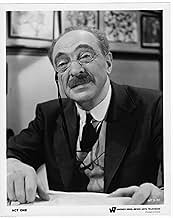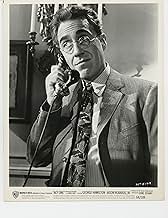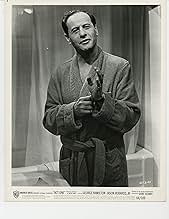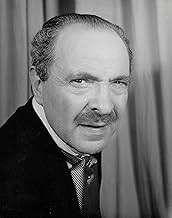Story of the life of writer/playwright Moss Hart.Story of the life of writer/playwright Moss Hart.Story of the life of writer/playwright Moss Hart.
Jonathan Goldsmith
- Teddy Manson
- (as Jonathan Lippe)
- Director
- Writers
- All cast & crew
- Production, box office & more at IMDbPro
Featured reviews
Moss Hart wrote one of the great books on theater, Act One, and here it's turned into a film starring George Hamilton as Hart.
The film also features Jason Robards as George S. Kaufman, Eli Wallach as a producer, George Segal as Hart's friend Lester, Sam Groom as a student, Ruth Ford as Mrs. Kaufman, Jack Klugman as a good friend to Moss, and Bert Convy as "Archie Leach," another friend, whom film fans know became Cary Grant.
The story goes from Hart's days as a young, serious playwright to the Broadway opening of Hart's first play, "Once in a Lifetime," co-written with George S. Kaufman. They became one of the finest Broadway writing teamsin theater history.
George Hamilton is a handsome man who has become a wonderful parody of himself and his tan in later years. He was never really much of an actor though he does an okay job here.
Someone certainly thought a lot of his looks here - he is photographed in closeup with a special light in his eyes, the kind designed for Dirk Bogarde in the '50s.
I don't know if Dore Schary, the director, had a limited budget or what, but casting Bert Convy as Cary Grant was such an insult to probably the biggest male film star of all time. Convy was nice looking, but he made no attempt at an accent. The problem is, it was too small a part to cast someone like John Gavin.
The rest of the performances were fine, but Jason Robards as Kaufman was a true standout. Wallach didn't have much to do.
The film has been criticized for being too sentimental. I didn't find it sentimental, I found it unexciting, when there's probably nothing more exciting than preparing a show for Broadway.
It's possible that the book wasn't really adaptable as a movie. It's hard to make writing exciting on screen. Hart was a huge talent who wrote some fabulous plays. I just don't think that somehow, his story made for an impressive film.
The film also features Jason Robards as George S. Kaufman, Eli Wallach as a producer, George Segal as Hart's friend Lester, Sam Groom as a student, Ruth Ford as Mrs. Kaufman, Jack Klugman as a good friend to Moss, and Bert Convy as "Archie Leach," another friend, whom film fans know became Cary Grant.
The story goes from Hart's days as a young, serious playwright to the Broadway opening of Hart's first play, "Once in a Lifetime," co-written with George S. Kaufman. They became one of the finest Broadway writing teamsin theater history.
George Hamilton is a handsome man who has become a wonderful parody of himself and his tan in later years. He was never really much of an actor though he does an okay job here.
Someone certainly thought a lot of his looks here - he is photographed in closeup with a special light in his eyes, the kind designed for Dirk Bogarde in the '50s.
I don't know if Dore Schary, the director, had a limited budget or what, but casting Bert Convy as Cary Grant was such an insult to probably the biggest male film star of all time. Convy was nice looking, but he made no attempt at an accent. The problem is, it was too small a part to cast someone like John Gavin.
The rest of the performances were fine, but Jason Robards as Kaufman was a true standout. Wallach didn't have much to do.
The film has been criticized for being too sentimental. I didn't find it sentimental, I found it unexciting, when there's probably nothing more exciting than preparing a show for Broadway.
It's possible that the book wasn't really adaptable as a movie. It's hard to make writing exciting on screen. Hart was a huge talent who wrote some fabulous plays. I just don't think that somehow, his story made for an impressive film.
"Act One" was a 1963 Dore Schary production, released through Warner Bros. and written and directed, as well as produced, by Schary, based on Moss Hart's entertaining memoir of his start in the theatre. After having had five of his plays — all serious dramas modeled after the works of Eugene O'Neill — rejected, Hart (George Hamilton) decides to take the advice of his friend and patron Joe Hyman (Jack Klugman) and his sort-of agent Richard Maxwell (Sam Levene) and write a comedy instead. He has no idea what he's going to do for a comedy plot until he reads an issue of *Variety* and notes that the featured story in it is the turmoil being caused in Hollywood by the advent of talking pictures. He concocts a story called "Once In a Lifetime" and drafts a play on it, only to get the runaround from a producer named Warren Simon, who keeps him waiting in the lobby of Simon's hotel for two days (during which time he's nearly bitten several times by an obnoxious small dog one of the bellboys is walking for a guest — I kept waiting for the payoff of the gag to be that it's Warren Simon's dog, but somehow Messrs. Hart and Schary missed that one). A friend of his who has a contact with the legendary producer Sam Harris (the man who partnered with George M. Cohan for years, gave the Marx Brothers their first major hit, "The Cocoanuts," and was reportedly so wonderful and sweet to everyone that the nastiest thing anyone could ever remember him saying about anybody was in 1933, when the Nazis took power in Germany, about which his comment was, "Hitler is not a nice fellow") gets Hart's play a reading in Harris's office, whereupon Harris's verdict is he'll produce it if Hart can get the legendary George S. Kaufman (Jason Robards, Jr.) to rewrite and direct it.
Work starts on the script, accompanied by a lot of bouncy underscoring by Skitch Henderson that doesn't sound anything like the real pop music of the 1920's and 1930's (and the "source" music heard throughout the film is only marginally closer!), and Schary proves utterly unable to make the on-screen act of writing seem dramatic. He may also have been hamstrung by being unable to quote more than snippets of the actual play Hart and Kaufman wrote: "Once in a Lifetime" was bought by Universal and filmed by them in 1932, and in the early 1970's PBS showed the film and hailed it as a major rediscovery — then it got stuffed back in the vaults and hasn't been let out since then! (The actual film of "Once in a Lifetime" and "Act One" would make an interesting double bill, and it definitely goes alongside "The Power and the Glory" and "The Man Who Reclaimed His Head" among the early-1930's movies that remain frustratingly unavailable on DVD.) Hart called the book on which the film was based "Act One" to denote that he wasn't writing his entire life story — just the start of his career — and it's full of wonderful Jewish character actors (including an unrecognizable George Segal at the start of his career as Hart's nihilistic friend Lester Sweyd). "Act One" the book I remember as a charming but also thrilling memoir that made the act of writing seem as vertiginously exciting as watching a tightrope walker; "Act One" the movie is charming but also awfully sentimental (a flaw in Hart's writing generally; just compare the well-made but sometimes sugary script he wrote for the 1954 version of "A Star Is Born" to the marvelously acerbic one Dorothy Parker co-wrote for the 1937 original), and George Hamilton doesn't look particularly Jewish (especially by comparison with the real-life Jews playing his parents, Martin Wolfson and Sylvia Straus!) but he acts the part well enough within limits — Charles commented that Hamilton's acting skills actually seemed to deteriorate as he got older and lost his boyish good looks! — and the supporting cast is a delight, especially Robards (though one wonders how someone that curmudgeonly could come up with so many great funny lines in his plays!) and Klugman.
Work starts on the script, accompanied by a lot of bouncy underscoring by Skitch Henderson that doesn't sound anything like the real pop music of the 1920's and 1930's (and the "source" music heard throughout the film is only marginally closer!), and Schary proves utterly unable to make the on-screen act of writing seem dramatic. He may also have been hamstrung by being unable to quote more than snippets of the actual play Hart and Kaufman wrote: "Once in a Lifetime" was bought by Universal and filmed by them in 1932, and in the early 1970's PBS showed the film and hailed it as a major rediscovery — then it got stuffed back in the vaults and hasn't been let out since then! (The actual film of "Once in a Lifetime" and "Act One" would make an interesting double bill, and it definitely goes alongside "The Power and the Glory" and "The Man Who Reclaimed His Head" among the early-1930's movies that remain frustratingly unavailable on DVD.) Hart called the book on which the film was based "Act One" to denote that he wasn't writing his entire life story — just the start of his career — and it's full of wonderful Jewish character actors (including an unrecognizable George Segal at the start of his career as Hart's nihilistic friend Lester Sweyd). "Act One" the book I remember as a charming but also thrilling memoir that made the act of writing seem as vertiginously exciting as watching a tightrope walker; "Act One" the movie is charming but also awfully sentimental (a flaw in Hart's writing generally; just compare the well-made but sometimes sugary script he wrote for the 1954 version of "A Star Is Born" to the marvelously acerbic one Dorothy Parker co-wrote for the 1937 original), and George Hamilton doesn't look particularly Jewish (especially by comparison with the real-life Jews playing his parents, Martin Wolfson and Sylvia Straus!) but he acts the part well enough within limits — Charles commented that Hamilton's acting skills actually seemed to deteriorate as he got older and lost his boyish good looks! — and the supporting cast is a delight, especially Robards (though one wonders how someone that curmudgeonly could come up with so many great funny lines in his plays!) and Klugman.
I am an actress and the book "Act One" is one of my favorites and a must-read for every actor, director, producer, etc. I know. The kind of book I re-read every 5 years or so. This movie was a disgrace. Although it had some good actors in it: Jason Robards, Jack Klugman, George Segal. Just awful and a slap in the face to the great Moss Hart. Bert Convy as "Archie Leach", a.k.a. Cary Grant and no English accent? What was that? Also, Moss Hart's family lived in grinding poverty and that was not shown accurately. The apartment they lived in looked much too nice. One of the many horrible things about it was the score! Intrusive, inappropriate, childish. Shame on you, Skitch Henderson!
The movie, unlike the weighty memoir upon which it was based, is a typical showbiz-in-the-1920s yarn about a young man making it big on Broadway in spite of his own insecurity and the many setbacks in the production of his first play. It is satisfying as such, with memorable performances by Jason Robards as the grumpy genius George S. Kaufman, Bert Convy as the struggling Archie Leach, and Eli Wallach as a Jed Harris-like obnoxious producer, and many other cameos of well known actors playing legendary New Yorkers of the day.
George Hamilton was too suave, too dapper, and just too damn pretty to be all that convincing as Moss Hart, but he was at his peak here, and he does a pretty good acting turn.
The story is predictable, but the movie still works, depicting a legend in an industry that loves legends about itself. There is a show playing in New York now based on the same material, and it is a huge hit. Maybe it portrays more of the poverty and the agony from which the real Moss Hart sprang, I don't know; but this movie hardly attempts to do that. Instead it gives us another fantasy of a time and place we love to think about and a life we would love to live. If you're not interested in that, this movie is not for you.
George Hamilton was too suave, too dapper, and just too damn pretty to be all that convincing as Moss Hart, but he was at his peak here, and he does a pretty good acting turn.
The story is predictable, but the movie still works, depicting a legend in an industry that loves legends about itself. There is a show playing in New York now based on the same material, and it is a huge hit. Maybe it portrays more of the poverty and the agony from which the real Moss Hart sprang, I don't know; but this movie hardly attempts to do that. Instead it gives us another fantasy of a time and place we love to think about and a life we would love to live. If you're not interested in that, this movie is not for you.
Although I recognized the name Moss Hart, I had to do some quick research to learn exactly why it rang a bell. I've never read the source material, so I can't comment on any correlation between the film and book. This review is based solely on my take on the movie in and of itself.
It pains me to write that this film is like drinking a glass of tepid water. It will keep you hydrated, but the impact on the taste buds is negligible. Just when I wanted to rate it a 5.1, something would bump it back to a 4.9. But then this is typical of a Schary project that never seems to rise above.
Hamilton does his best with what he has to work with. Robards isn't given much of a meaty role, but he delivers. I enjoyed Klugman's performance the most. Sylvia Straus, as Hamilton's mother, does a fine job, too.
What I like best about the film is that it does give a glimpse into just how hard it is to achieve major success in the entertainment industry, as told from the point of view of someone already making a semi-living in the business. The tales about an artist being plucked from obscurity and becoming an overnight, wildly successful sensation are fun but don't truly represent reality. Many, many people work for years and years and never witness the accolades due them, regardless of occupation.
This movie shows what happens if you don't give up. Unfortunately, it does so in an unforgettable, bland, and slightly boring fashion. Don't expect too much from it.
It pains me to write that this film is like drinking a glass of tepid water. It will keep you hydrated, but the impact on the taste buds is negligible. Just when I wanted to rate it a 5.1, something would bump it back to a 4.9. But then this is typical of a Schary project that never seems to rise above.
Hamilton does his best with what he has to work with. Robards isn't given much of a meaty role, but he delivers. I enjoyed Klugman's performance the most. Sylvia Straus, as Hamilton's mother, does a fine job, too.
What I like best about the film is that it does give a glimpse into just how hard it is to achieve major success in the entertainment industry, as told from the point of view of someone already making a semi-living in the business. The tales about an artist being plucked from obscurity and becoming an overnight, wildly successful sensation are fun but don't truly represent reality. Many, many people work for years and years and never witness the accolades due them, regardless of occupation.
This movie shows what happens if you don't give up. Unfortunately, it does so in an unforgettable, bland, and slightly boring fashion. Don't expect too much from it.
Did you know
- TriviaFirst film role of Jonathan Goldsmith (as Jonathan Lippe), who portrayed Teddy Manson, and who is now much better known as "The Most Interesting Man in the World" from Dos Equis beer TV commercials.
- GoofsIn an early scene, Moss Hart (George Hamilton) hears a radio news broadcast reporting that Colonel Theodore Roosevelt has just returned from an Asian excursion and that the "former president was in excellent spirits". This refers to an actual news event reported on September 10, 1929, but it was President Roosevelt's son, also named Theodore, who made the trip. The former president had died in 1919.
The radio also reports that the New York Yankees defeated the Detroit Tigers 9-3 the previous day, but the game occurred two days earlier and the previous day's game had been postponed because of rain. The news report is read nearly verbatim from the New York Times' account of the game.
- Crazy credits"Curtain" (instead of "The End")
- ConnectionsReferenced in I've Got a Secret: George Hamilton (1963)
Details
- Runtime
- 1h 50m(110 min)
- Color
- Aspect ratio
- 1.66 : 1
Contribute to this page
Suggest an edit or add missing content
































